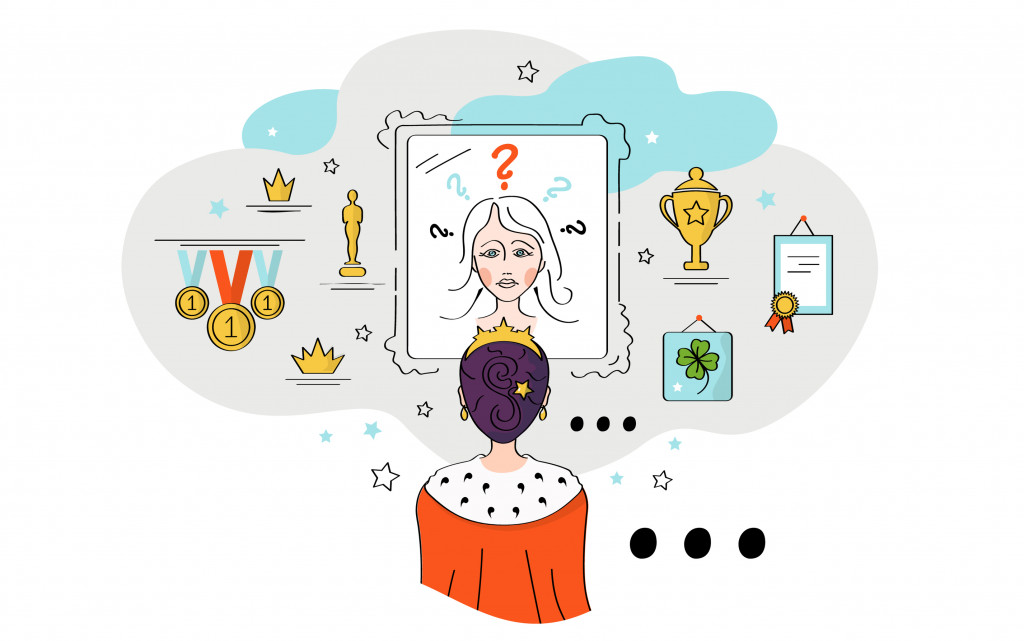Table of Contents (click to expand)
People who underperform on any skill tend to overestimate their abilities. This is due to a cognitive bias in self-assessment, called the Dunning-Kruger effect.
We all have that one friend, colleague, or acquaintance who constantly claims to be an expert at something, while in reality, their skills or performance in the area is nothing but average at best. We often wonder why they wildly overestimate themselves by making such claims. Why is it that we seldom see a true expert in any field making such claims about themselves?

It makes you wonder if there is indeed a correlation between how incompetent a person is and their tendency to resort to bragging. Is there a link between the two, and if yes, why?
Do We Present Ourselves Accurately?
Humans often present themselves in ways that gain approval from others due to social pressure. This aspect, called ‘self-presentation’ has been widely studied in social psychology. Engaging in such behavior is very common, as humans are social beings. We love external validation or acceptance from fellow beings in society.

However, certain individuals attempt a disproportionately positive self-presentation, as compared to their actual skills. Plainly speaking, they resort to boasting, when in reality their skills are rather unremarkable.
A correlational study in the early 1980s attempted to study this effect. Their analysis revealed that people who use more positive self-descriptions, in reality, have fewer markers of attainment. The study stated that the frequent use of status symbols or self-aggrandizement is more common among individuals who are more insecure about their skills. Furthermore, it also stated that someone with actual training or more years of experience in a field was less likely to bring others’ attention to their skills.
The study also identified a link between the tendency to use more positive self-descriptions and a person’s level of education or experience. In other words, more educated individuals were less likely to indulge in bragging. They also showed a lower desire to influence others in their area of expertise. The study theorized that individuals who are incompetent may boast in an attempt to feel more “complete”, due to their insecurity. In contrast, people who are actually competent feel complete due to their extensive education, training, or experience, and hence do not feel the need to brag.
Also Read: Why Do Intelligent People Constantly Doubt Themselves?
Overestimation Of Self – A Cognitive Bias
Early studies showed initial evidence for a link between insecurity and positive-self description. Later studies analyzed whether an actual “error of judgment” occurs when one tries to accurately measure one’s own ability. Is there a cognitive bias when we judge ourselves?

This was extensively studied by Dunning and Kruger in the late 1990s. In the studies, they tested participants on measures of humor, grammar, logic, etc., and obtained self-assessments of the participants on the same areas. It was observed that the participants who fall at the bottom in terms of performance tended to overestimate their abilities. In other words, having a bad performance was seen to be correlated with low awareness of their own poor ability. This cognitive bias is now called the Dunning-Kruger effect (DKE).
Interestingly, in these studies, it was also observed that improvement in the individuals’ skills improved their self-awareness as well. This proves that it is possible to improve or overcome this bias by training oneself to perform better on a particular ability or skill.
Recently, scientists were able to demonstrate that the brains of overestimators and underestimators respond differently during tasks involving learning and memory. In this study, they employed a technique called electroencephalography (EEG), which measures electrical responses from neurons in the brain using electrodes placed on the scalp. The scientists used EEG on participants while they learned a particular task and memorized it. They later performed the task and recorded their self-assessment on their task performance. Based on the self-assessment, participants were divided into two groups – overestimators and underestimators.
Measuring brain responses using EEG showed that a region in the brain called the parietal area demonstrated distinct “wave patterns” in overestimators and underestimators, demonstrating a cognitive basis for the Dunning-Kruger effect. Furthermore, they also observed that overestimators were not only incorrect in their self-assessment, but also significantly faster during training items prior to the task, while underestimators spent a longer time learning. Thus, even learning and memory processes were seen to be affected by this widespread cognitive bias.
Also Read: Why Do Foolish People Think That They Are Very Smart?
A Final Note
Studies on self-presentation and self-awareness tell us that we are extremely bad at judging our own capabilities accurately, or presenting ourselves without being biased. This often leads to people overestimating or positively presenting themselves, which can often be viewed as a form of bragging in society.
Psychologists believe that this results from having a “mental blind spot” about ourselves. However, science also supports claims that such individuals tend to be underperformers. It would not be wrong to say that bragging, insecurity, and low skill or performance are all correlated. This is especially true since evidence exists on the reverse effect, where people who are great performers tend to consistently rate themselves very badly.

Termed as imposter syndrome, many great individuals in the fields of science, art, literature and academia suffer from this condition of constant self-doubt, despite their extreme degree of skill, performance or intelligence. Both of these effects may seem equally ridiculous to an onlooker who is devoid of such a bias in their judgment.
So, next time that annoying friend or colleague brags to you, it might help to remember that they aren’t aware of their shoddy skills! As William Shakespeare rightly said, “A fool thinks himself to be wise, but a wise man knows himself to be a fool”. Apparently, science agrees!
How well do you understand the article above!

References (click to expand)
- Wicklund, R. A., & Gollwitzer, P. M. (1981, June). Symbolic Self-Completion, Attempted Influence, and Self-Deprecation. Basic and Applied Social Psychology. Informa UK Limited.
- Kruger, J., & Dunning, D. (1999). Unskilled and unaware of it: How difficulties in recognizing one's own incompetence lead to inflated self-assessments. Journal of Personality and Social Psychology. American Psychological Association (APA).
- Muller, A., Sirianni, L. A., & Addante, R. J. (2020, August 28). Neural correlates of the Dunning–Kruger effect. European Journal of Neuroscience. Wiley.
